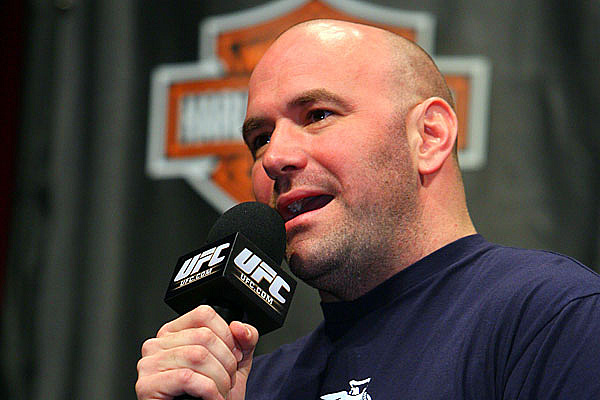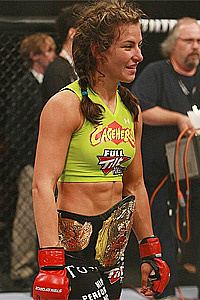Uncertainty at Hand for Women’s MMA
Jason Probst Jul 15, 2011

UFC
President Dana White has stated that depth is the major issue with
women’s MMA. | Photo: D. Herbertson
The Ultimate Fighting Championship’s acquisition of Strikeforce left women’s MMA at a murky crossroads. Once safely ensconced under the Strikeforce umbrella -- a quickly-growing brand that survived as other upstart promotions fizzled en masse -- it faces an uncertain future.
Ironically, the brief history of women’s MMA closely mimics the origins of the sport itself. Initially relegated as a sideshow attraction, the emergence of talent and marquee performers helped build a degree of credibility and momentum. Women’s MMA also helped nascent-if-ambitious promotions like EliteXC tap into that talent base, with stars like Gina Carano pulling new demographics into viewership.
Advertisement
To discuss the future of women’s MMA, Sherdog spoke with Bellator Fighting Championships CEO Bjorn Rebney, trainer Greg Jackson and Miesha Tate, who challenges Marloes Coenen for the Strikeforce women’s 135-pound title on July 30.
After the March acquisition of Strikeforce by UFC parent company
Zuffa LLC, Bellator suddenly found itself as the second-biggest
promotion in MMA. With an ambitious schedule on MTV2, the
organization will air 25 shows in 2011, 27 in 2012 and 29 in
2013.
According to Rebney, the promotion will continue to showcase women’s MMA, hoping to build on the good fighters and memorable fights and helping cement its legacy, this despite a somewhat dubious approach by other organizations in pushing it. For Rebney, presenting top female fighters and fights was ultimately a better long-term strategy.

Bellator
CEO Bjorn Rebney File Photo
Bellator is no stranger to women’s MMA.
In 2010, Bellator staged an eight-woman tournament at 115 pounds. It played out over three shows, culminating with Zoila Gurgel’s decision over Megumi Fujii at Bellator 34 in October.
“So I sat down with our development team and thought, ‘We can put together a tournament; let’s do it.’ And that was the genesis of the idea,” Rebney said. “Every lady but one that came into the tourney was ranked in the Top 10 of that respective weight class.”
Bellator will move forward with women’s MMA, Rebney said, as the ladies of the sport have become closely linked with the brand itself.
If a consistent trend exists in UFC President Dana White’s decision-making process, it can be found in realizing an opportunity for a viable commodity previously untapped. From the UFC’s massively expanded programming schedule in recent years to the ramped-up delivery of fights on cable TV and the integration of social media to stream undercard bouts, the promotion has rarely missed a chance to capitalize. It has reconciled with fighters who have left the organization, built the brand in fresh ways through merchandising and even signed EliteXC castoff Kimbo Slice in what proved a ratings coup for Season 10 of “The Ultimate Fighter.”
In a recent interview with the Forbes Sports Money show, White addressed women’s MMA in the context of the Strikeforce acquisition, along with his stance on why he is not yet looking to move women’s MMA into the UFC.
“There’s this big misconception that I don’t like women’s fighting. The problem with women’s fighting -- and it was a problem with boxing, and it’s a problem with MMA now -- is you don’t have [enough] women [who] are good enough to create an entire division,” White said. “What you get is a couple of women that are really good and a lot of women that really aren’t. And I don’t like lopsided fights, especially with women. So, as the sport continues to grow … if you can create an entire division of talented women, I’m all about it.”
While promoters can study the question from the arm’s-length perspective of ratings, spreadsheets and business-case acumen, fighters like Tate are afforded no such luxuries.
Making a living as a fighter has proven a difficult proposition, with getting over the critical hump of making enough money through fight purses, sponsorships and various revenue streams. Seeing the biggest vehicle for women’s MMA get absorbed into the UFC would be a tough blow for female stars like Tate, who were just starting to make headway as women’s MMA grew in recent years.

Miesha
Tate File Photo
Tate went 4-0 in 2010.
“I was nervous and worried [with news of the merger]. Obviously, Dana White is not a big fan of women’s MMA. He’s been pretty vocal about that. I know a lot of my career is in his hands,” Tate said.
After a stellar 2010 -- during which she went 4-0, including three wins at Strikeforce events -- Tate takes on Golden Glory’s Coenen for the Strikeforce women’s welterweight belt later this month in Hoffman Estates, Ill., just outside Chicago. The immediate future of Strikeforce’s most prominent female star, 145-pound champion Cristiane “Cyborg” Santos, remains unsettled, though it appears she will eventually re-sign with the promotion. Tate plans to solider on with or without the Brazilian’s box-office appeal.
“We just need to keep doing what we’re doing,” Tate said. “Women put on good fights. We need more numbers, deeper divisions and competitive fights. At that point, it might turn Dana’s head enough to say, ‘If I invest in this, I’ll get something back.’ So I assume we have until the end of the Showtime contract to get it together.”
Jackson offered his opinion on the subject, as well, citing that women’s MMA, like the sport itself, just needs time to grow and develop the kind of depth the men’s game fields -- with the support of a major promotion a plus but not integral to its survival.
“Just because you don’t have a big stage doesn’t mean you are going to kill or injure women’s MMA. The bigger stage will come by itself,” said Jackson, who currently trains UFC champions Georges St. Pierre and Jon Jones. “What you have is a cultural bias, not a technical bias. There’s lot of great women’s fights. You look at some of the guy fights, and some of women’s fights are better. Look at someone like Cyborg. She’s got amazing kickboxing, and there’s a lot of people that have looked really good with their wrestling, jiu-jitsu and kickboxing. Women have made a lot of progress. There’s no reason you shouldn’t be able to do something just because you weren’t born with a penis.”
Ultimately, Rebney feels that past actions are the best indicators of what the UFC will do with women’s MMA. When it can be effectively monetized and folded into the game’s most prominent company, it will happen, similar to moves to add new divisions in recent years.
“It’s maybe like the bantams a few years ago. Guys were matched up and put on beautiful fights, but there wasn’t the platform to promote them until the WEC started giving them a push,” Rebney said. “But I do without question believe there’s room for it and a demand for it. Who knows what the UFC will do in the next few years, but numbers talk.”
Jason Probst can be reached at [email protected] or twitter.com/jasonprobst.
Related Articles






